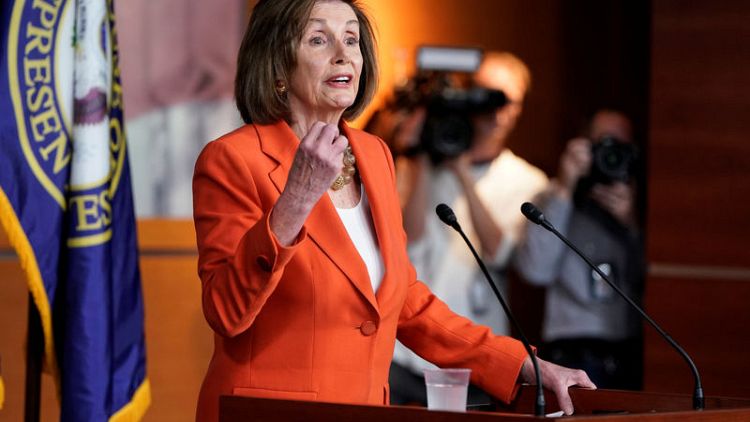By Patricia Zengerle and Richard Cowan
WASHINGTON (Reuters) - A deeply divided U.S. House of Representatives took a major step in the effort to impeach President Donald Trump on Thursday when lawmakers approved rules for the next stage, including public hearings, in the Democratic-led inquiry into Trump's attempt to have Ukraine investigate a domestic political rival.
In the first formal test of support for the impeachment investigation, the Democratic-controlled House voted almost entirely along party lines - 232 to 196 - to move the probe forward in Congress.
The vote demonstrated unity among Democrats who accuse Trump of abusing his office and jeopardizing national security for personal political gain. But they did not pick up a single Republican vote.
"It's a sad day. No one comes to Congress to impeach a president," House Speaker Nancy Pelosi said before the vote.
Televised public hearings featuring U.S. officials testifying in Congress about alleged wrongdoing by Trump could crowd out other issues like the economy and immigration as voters turn their minds to the November 2020 presidential election.
That might damage Trump but some of his supporters say the impeachment drive could actually boost his re-election chances by showing him at loggerheads with Washington-based political foes.
Republicans accused Democrats of using impeachment to overturn the results of his 2016 victory.
"The Greatest Witch Hunt In American History!" Trump wrote on Twitter after the vote.
The probe focuses on a July 25 telephone call in which Trump asked his Ukrainian counterpart, Volodymr Zelenskiy, to investigate Trump's Democratic political rival Joe Biden, a former U.S. vice president, and his son Hunter, who had served as a director for Ukrainian energy company Burisma.
Biden is a leading candidate in the Democratic presidential nomination race to face Trump in the November 2020 election. He and his son have denied any wrongdoing.
Trump has also denied wrongdoing. Republicans have largely stuck by him, blasting the effort as a partisan exercise that has given them little input.
REPUBLICAN PUSHBACK
"The country next year will be deciding who our president is going to be. It should not be Nancy Pelosi and a small group of people that she selects that get to determine who is going to be our president," said Kevin McCarthy, the top House Republican.
Just two Democrats - Collin Peterson of Minnesota and Jeff Van Drew of New Jersey - voted against the measure. Both represent districts where Trump won in the 2016 election. Other Democrats from Trump-leaning districts, such as Jared Golden of Maine, voted yes.
If the House eventually votes to impeach Trump, that would set up a trial in the Republican-controlled Senate. Trump would not be removed from office unless votes to convict him by a two-thirds margin, something that looks unlikely as congressional Republicans have been reluctant to move against the president.
House Judiciary Chairman Jerrold Nadler declined say when public hearings would start but they are expected to begin in the next few weeks.
The U.S. Constitution gives the House broad authority to set ground rules for an impeachment inquiry and Democrats say they are following House rules on investigations. They have promised to hold public hearings on the case against Trump.
Lawmakers leading the inquiry heard closed-door testimony from Tim Morrison, the top Russia specialist on Trump's National Security Council. Morrison resigned from his position on Wednesday, a senior administration official said.
Members of the three committees conducting the investigation expect Morrison to fill in more of the details about Trump's dealings with Ukraine. Morrison listened in on the July 25 phone call and said the call "could have been better," according to acting U.S. Ambassador to Ukraine Bill Taylor.
Committee members have asked a far more prominent player, former national security adviser John Bolton, to appear next week. Others have testified that Bolton was alarmed by a White House effort to pressure Zelenskiy. Bolton's lawyer has said he was not willing to testify unless a subpoena is issued.
(Additional reporting by Doina Chiacu and Daphne Psaledakis; Writing by Daniel Wallis; Editing by Andy Sullivan and Alistair Bell)
